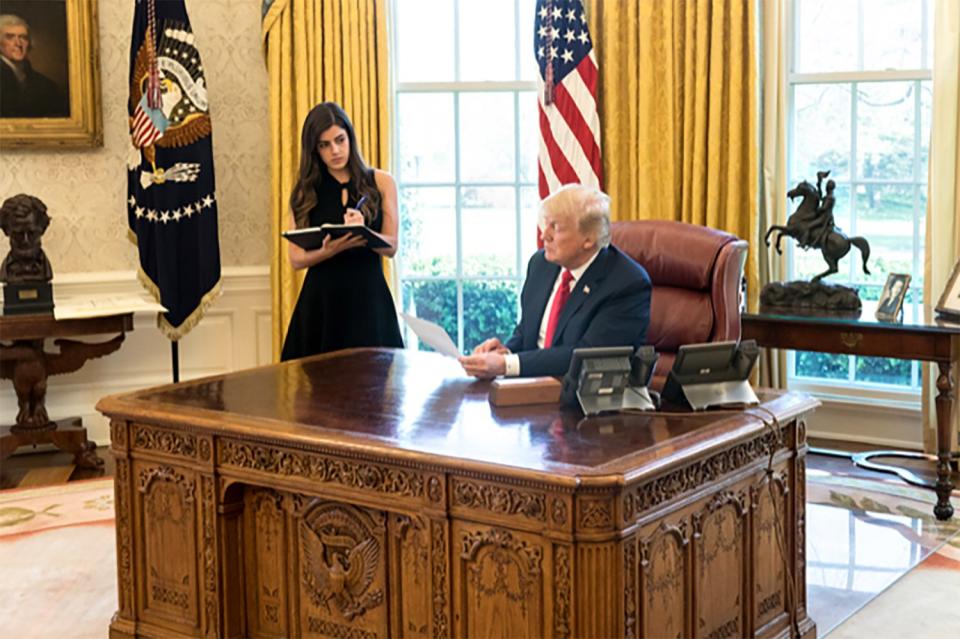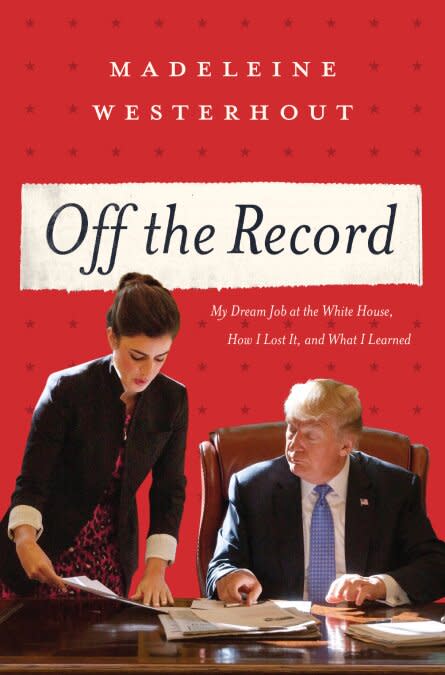Trump's Ex-Assistant — Ousted After Loose-Lipped Dinner with Reporters — Tells Her White House Story
Trump's Ex-Assistant — Ousted After Loose-Lipped Dinner with Reporters — Tells Her White House Story
"I think this book reads almost like my diary," Madeleine Westerhout says of the fittingly titled Off the Record
Madeleine Westerhout has unfailingly positive things to say about President Donald Trump and his wife and children.
Well ... mostly.
This is the big twist of Westerhout's life: The 29-year-old, who had worked as Trump's executive assistant since he entered the White House and was eventually promoted to director of Oval Office operations, was forced out last summer after sharing intimate details about the Trumps at an off-the-record dinner with reporters.
Among the revelations, according to other accounts?
That she felt she had a stronger relationship with President Trump than his daughters, Tiffany or Ivanka, the latter of whom is also a senior adviser.
Westerhout reportedly said that Trump felt Tiffany was overweight and didn’t like being photographed with her because of that. ("I love Tiffany, doing great!" the president soon tweeted.)
Word spread quickly around the White House of what Westerhout had said, and she was ousted in late August 2019. She did not speak publicly, save for a brief tweet of her own about her gratitude for her time in the administration.

D. Myles Cullen From left: Madeleine Westerhout taking dictation in the Oval Office with President Donald Trump
Almost exactly a year later, Westerhout is back with a story to tell — about her time in the White House, about the night that cost her her job and the personal turmoil that followed.
"As much as I wish this dinner didn't happen and things didn't end the way they did, I am really glad that I learned a lot from this," she tells PEOPLE of Off the Record, which was released Tuesday.
"I was devastated after I lost my job," Westerhout says. "And I realized that I was nowhere near ready to jump into something new, and I wanted to take the time to process what happened. And I think this book reads almost like my diary."

D. Myles Cullen From left: Vice President Mike Pence, Madeleine Westerhout and President Donald Trump outside the Oval Office near Westerhout's desk.

Center Street
'The Most Important Intersection in the World'
There is a tradition, in Trump's three-plus years in office, of aides leaving his White House with plenty of negative things to say, either to reporters or on their own: about the dysfunction and inexperience beget by a leader more venal than venerable.
Westerhout's is not that kind of book.
"I spent over two and a half years sitting outside the Oval Office, and I wanted people to get a more accurate depiction of our president," she says. "I believe he loves this country, and he is doing everything in his power to keep the American citizens safe, and I just wanted to share with people the President Trump that I got to know."
Widely referred to as Trump's "gatekeeper," the Orange County, California, native joined the White House on Inauguration Day in January 2017.
As Westerhout recounts in her book — a significant portion of which doubles as memoir — she had risen up the ranks of the Republican National Committee and first caught the future president's eye on TV. She was tasked with escorting candidates and other guests past the crowd of press at Trump Tower in New York City during the transition in late 2016, after Trump won the election.
As his White House assistant, stationed in what she calls the outer Oval Office, Westerhout arranged Trump's calls, directed his attention and managed his schedule.
Figures high and low went past her desk — or stopped there to try and gain an entrance with the president himself. (Occasionally, she writes, confused passersby would wander in thinking they were actually headed to the lobby of the West Wing.)
"Saying no to protect the president’s time was my job, and I became good at it. If I hadn’t been, there would have been chaos in the Oval Office," she writes. "Someone once told me, 'You’re a traffic cop at the most important intersection in the world.' "
She sometimes had a hand in helping him write his tweets before he signed off on sending them, and she relished in the finger-in-the-eye-of-the-establishment energy.
She also chafed at some of his more outlandish impulses, though she doesn't dwell on those messages (which have included baseless claims of murder, attacks on women and civil rights icons and other inflammatory behavior). Her defense of his Twitter-iest habits evinces a kind of tact — or thoughtlessness, depending on the view.
"Not everybody is going to love every single tweet," she says, channeling an outlook — too rose-colored to be realistic, critics will say — that threads her book.
"While there might be a few in there that I don't personally love," Westerhout says, "I think I would much rather have someone who gives us a full and honest account of what they're thinking and doing than someone who stands up and gives another stump speech."
RELATED: What Trump’s Assistant Madeleine Westerhout Said About Tiffany Trump That Forced Her Out of the Job
The Trump that Westerhout depicts is recognizable in some ways — a low-fi newspaper aficionado who prefers to conduct business via phone, often with cable news humming nearby; courting the feedback of many; relishing any and all tweets he can think up — until, throughout her book, that version of him swerves toward something more open hearted.
Her account clashes with some others. Former Apprentice contestant-turned-White House aide Omarosa Manigault Newman savaged the president in a tell-all in 2018 and his former National Security Advisor John Bolton and former Secretary of Defense James Mattis were no less unsparing in more recent remarks.
These opinions, taken together, say Trump is dwarfed by the job of the presidency: ill-equipped and ill-tempered.
Not so, Westerhout insists.
She writes of how Trump had received the family of slain Navy SEAL William Ryan Owens and how, one day, he invited in a group of people protesting outside the White House whose relatives had been killed by immigrants who entered the country illegally.
“Bring them in. I want to talk to them. What they have to say is important,” he said, according to her book.

D. Myles Cullen From left: Madeleine Westerhout and President Donald Trump in the Oval Office
RELATED VIDEO: The Chicks' Natalie Maines Jokes She'd 'Make Out' with George W. Bush Now in Comparison to Trump
The Chicks' Natalie Maines Jokes She'd 'Make Out' with George W. Bush Now in Comparison to Trump
By comparison, the Chicks would embrace former President George W. Bush with open arms
"The president connects with people on a very intimate level, which I saw for myself every day," she writes, in a characteristic assessment.
"The people who suggest that the president doesn’t read don’t know what they are talking about," she writes in another passage. "He reads constantly."
Echoing her former boss, she lambastes journalists for distorting Trump's more humane traits and undercutting what she calls the truth about his workaholic habits and endless energy.
"I’ll go as far as to say that he has more energy than everyone else in the West Wing," she writes. "We could barely keep up with him."
Westerhout tells PEOPLE: "It wasn't until I got to know him that I saw a different side of him and I realized how wrong I had been to just blindly believe everything the mainstream media said."
Trump's pugilistic and provocative style — spreading conspiracy theories, sometimes criticizing people in jarringly personal terms — she chalks up to his habit of counter-punching. It's a familiar defense by the White House: The president had no choice but to respond.
Possible pushback to Off the Record as sanded-down and glossed-over doesn't faze Westerhout either: "People can say what they want. I'm focused on telling my story and talking about the president that I got to know."
Indeed, later in her book Westerhout admits that — as a more traditional conservative drawn to figures like George W. Bush and Marco Rubio — she had been slow to understand Trump's appeal. She wrote in another name on her 2016 presidential ballot and she cried at his narrow victory.
Her awakening came later, once she began working with Trump's transition team while at the RNC and then followed him to the White House.
There, she thrived. Truly, she writes, she felt like the president began to view her as one of his own. She remembers Ivanka's husband, Jared Kushner, once saying, "Madeleine is part of the family now. We can really trust her.”
But looking back, the power afforded to her by her position also darkened her personality.
She writes: "[Former Press Secretary] Sarah Sanders used to tell others, 'The person I’m the most terrified of in the White House is Madeleine.' We got along great, and I consider her a true friend, but I don’t think she was entirely kidding."
And then came the dinner.
'Reveling in the Most Unusual Role'
The wine is about the only thing everyone seems to agree on about the night that Westerhout cost herself her job.
She had traveled with the president to his New Jersey golf club and, with an evening off, had been invited by another aide to an off-the-record dinner with four reporters.
"Those types of get-togethers are actually fairly common on the road," she writes. "The press sees such a dinner as a chance to get better acquainted with members of the White House staff, and to ensure that it’s a social and not official occasion, it’s made clear at the outset that everything is off the record" — meaning not usable for publication.
In her book, Westerhout says she had long been reticent around the press (though later she writes of speaking anonymously with a Politico writer). But that night, buoyed by a recent compliment the president said First Lady Melania Trump had paid her — about resembling Audrey Hepburn — she surprised herself by agreeing to the invitation.
"It was Saturday night, and I had nothing else to do. ... The fact that I had been drinking throughout the day and my defenses were down also had something to do with my changing my mind," she writes.
At the meal, then-White House spokesman Hogan Gidley departed for a cable news appearance and, in the hour before he returned, the wine flowed, Westerhout writes.
"I felt comfortable, and I thought I was in total control," she writes. "For a change, I was the center of attention, not Hogan, and as much as I thought of myself as someone who preferred to be out of the spotlight, a part of me relished it. It comes from a need for approval and a desire to please others, which goes back as long as I can remember."
Drink after drink, question after question.
"I don’t remember how many glasses of Sauvignon Blanc I drank, but it did its job," Westerhout writes. The reporters — from Bloomberg, Reuters and The Washington Post — asked about "the president’s relationship with Tiffany" and how his teenage son, Barron, was "adjusting."
In her book, Westerhout writes that while she "can’t recall everything" she said, "I gave them answers with great enthusiasm, reveling in the most unusual role for me."
She paraphrases one answer in her book as "Tiffany is a young woman trying to find her way" and of Barron, she recalls saying, in part: "Barron is a typical thirteen-year-old boy."
She writes skeptically that she could have dished as described about the president and his kids — especially about Tiffany's weight, given her own issues with disordered eating — but she doesn't deny the possibility of having said what others remembered her saying.
"It's hard for me to believe that I made those comments, because I know that the comments that are reported I made are not true and I don't believe them to be true," she tells PEOPLE. "But I take responsibility for what was reported and I'm not looking to re-litigate that night."
In her book, she writes of wanting to spread the blame — more equally, in her view — to the reporters who she says must have violated the off-the-record agreement in a roundabout way. (The story was first covered by Politico and The New York Times, neither of whom had staffers at that dinner.)
Or, perhaps, another White House aide had it out for her and saw the slip as ammunition.
With PEOPLE, she is more reserved: "I'm focused on forgiveness and providing a really important insight on the man that I got to know, who's a great leader, father, husband and just trying to look forward."

Courtesy Madeleine Westerhout Madeleine Westerhout
'A Lot of Peace'
Now back home in California, Westerhout says Off the Record isn't a Trump-targeted mea culpa.
The president did, however, go out of his way to praise her book this week — after a more veiled tweet last year implying she had signed a "fully enforceable confidentiality agreement," which she says isn't true.
Westerhout says she has "no expectation of going back into the White House. I think I can be an advocate for President Trump on the outside and kind of a breath of fresh air for people."
She's been periodically in touch with the family but never heard back from Tiffany, after apologizing via text last year.
"I'm not closing the door on any opportunities," she says. "I do hope that this book opens some doors for me. But I think we're in the midst of a global pandemic. And so I think like most Americans I am focusing on spending time with my family, on my health. And taking a breather."
She will turn 30 in October. "I'm hoping," she says, "the next five to 10 years bring me a lot of peace."

 Yahoo News
Yahoo News 
